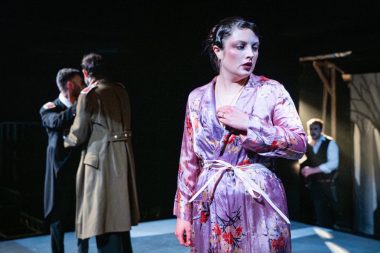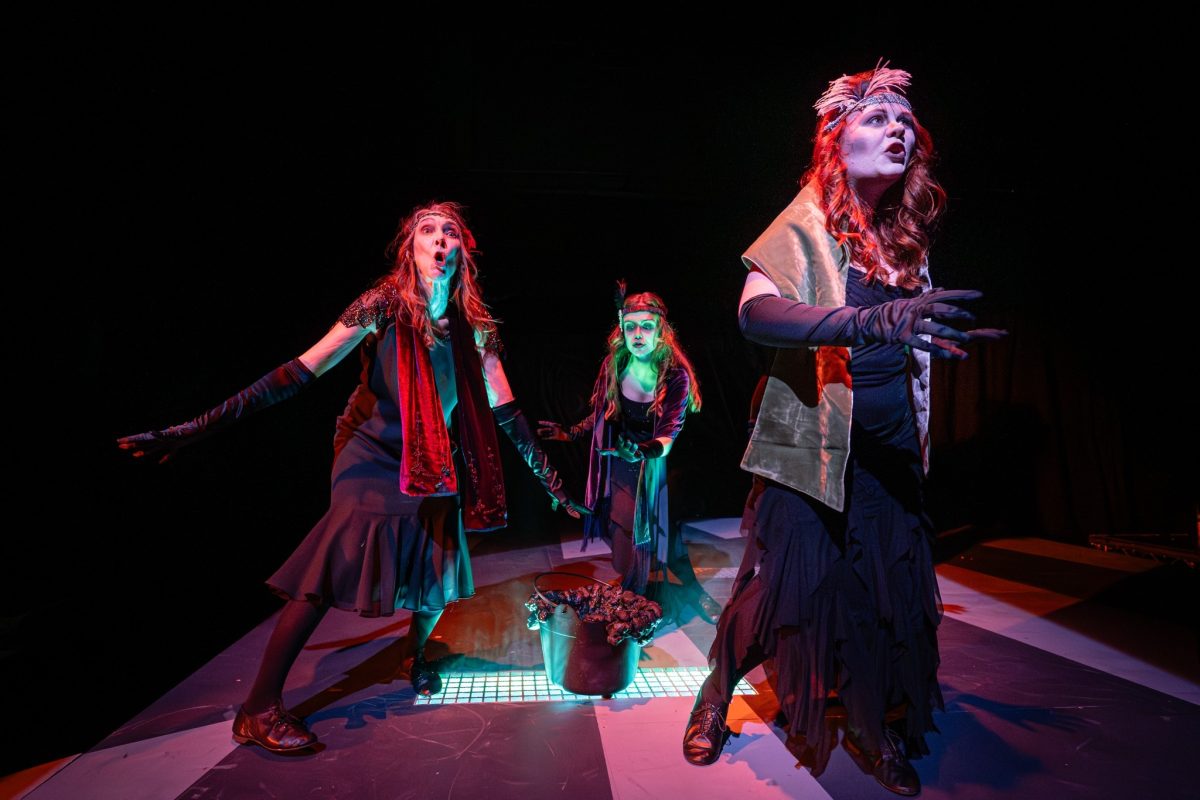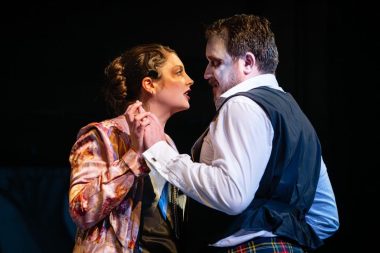MACBETH is not only the bloodiest of Shakespeare’s tragedies but it’s also the one where directors oft let rip their creative juices by staging it in the whackiest of styles, times and locations.
I’ve seen productions straying from the traditional highlands of Scotland to the mobland speakeasies of Chicago in the roaring 20s and high-rise tower blocks on 1970s Chelmsley Wood.In this Crescent production the talented Colin Simmonds has opened his Pandora’s box to reveal his ‘expressionist’ conception. This involves a lot of dark rings around the eyes of deathly white faces – which reminded me of an episode of ‘The Walking Dead’. Nothing wrong with that – it’s original and by having his actors move like chess pieces in a simple, murky space Simmonds brought his vision of the story to life – and of course death. Helping to create the visualisation, he’s enlisted BOA stage and screen students to do the coiffeury and greasepaint.
Simmonds unleashes an abundance of delights out of his box, starting off with the world’s three most famous witches dressed as nurses tending to a bloodied and bandaged captain. Here, Ellie Thompson, Charlotte Thompson and Paula Snow are seductive Sirens, not your run-of-the-mill horrible hags. They turn from nursing the poor soldier (the first of several roles played by the always colourful Simon King) to ripping off his body parts to go into their hubble-bubble store cupboard. In answer to the question ‘When shall we three meet again?’ why, we are destined to meet these naughty girls in many guises – including cocktail waitresses – before the curtain comes down.
Picture by Graeme Braidwood. s
Staying with Simon King, he warrants a mention too as Porter, the token fool. In a welcome respite from the zombies – sorry clansmen – King comes down into the audience to deliver a clever stand -up comedy soliloquy, which earns him well-deserved and spontaneous applause.
The technical team at the Crescent hit the top bar as nearly always, there’s a simple, bleak set from designer Graham Comley paired with a clever painting design from Colin Judges combining to create a nebulous yet mean acting space. The story is unpinned by some dark original music from Brendan Stanley with smoke-filled moody lighting from Matt Randell.
Stephen Message and James C Commander as the two murderers were my favourite cameos. Dressed in shabby macs and bowler hats with faces that glared pure evil with voices to send a shiver down the spine, they go about their odious business with jackal- like efficiency. The gifted Mr Message also made an excellent Duncan and completed a triple outing as a doctor with a bedside manner as charming as his murderer’s was chilling.
Robert Laird in the title role reminded me of Al Pacino as Michael Corleone in the original ‘The Godfather’ in which he stars as the innocent and lovable younger brother and ends up the amoral one who signs the death warrants for the family rivals. Laird’s journey is more extreme; he starts as gently as Pacino, but ends up an insane monster literally wallowing in blood. ‘Laird goes large’ if I may coin a phrase and he does it with integrity.

Picture by Graeme Braidwood. s
Rachael Maltby as Lady M is simply joyous – she glides rather than moves around the stage and seduces with a silken tongue. Her journey is impeccable, making the most of every word and gesture – and her demise, where she is scuttling on all fours like a terrified spider caught under a water glass, is a real tour-de-force.
A special shout-out to Oliver Jones who also gives a standout performance – as Macduff. His delivery of Shakespeare’s text was exemplary. Which brings me onto my final points – I have heaped well deserved praise on this Simmonds production and I note from the programme that his Art Management support was from the seasoned oracle that is Michael Barry. Both Barry and Simmonds would, I am sure, agree that the most important person in the rehearsal room is the writer, even if they have been dead for centuries. Whist the principals I have mentioned had an excellent handle on delivery, in many of the minor roles, dialogue was shouted not delivered. Shouting doesn’t make delivery and it confuses rather than helps the audience’s understanding. Set as it was in the Ron Barber studio even whispers can be indulged in.
For this reason, the production falls short of the golden five stars. It’s a fabulous night’s theatre though with some terrific fight scenes choreographed by Kaz Luckins who puts the cherries on the Scottish cake.
Macbeth runs ‘Tomorrow and tomorrow and tomorrow’ (and a few more tomorrows after that). The ‘house full’ signs are up most nights so I wouldn’t wait for tomorrow if you fancy a good night of classical gore.
Click here for times, tickets and more information on Macbeth at The Crescent (which runs until November 22).
Review by Euan Rose
Euan Rose Reviews

